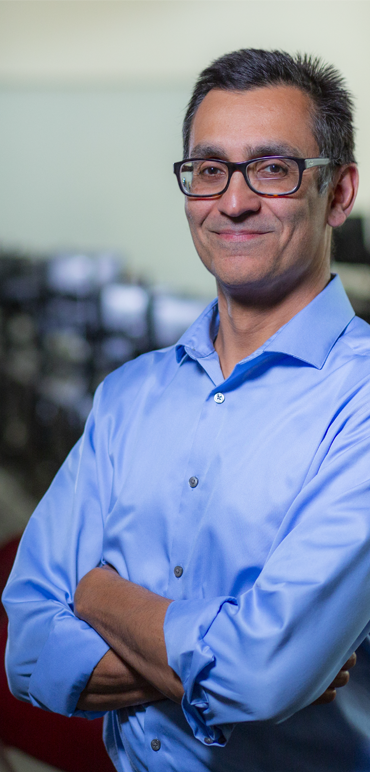Raj Raman, Morrill Professor of agricultural and biosystems engineering, sees the purpose of any university as creating new knowledge and building human capital. In his research to improve engineering education, Raman does both.
Open doors, engaging instruction
“Iowa State opens our doors to a wide array of students, and most first-year students are taking a big step up, learning a new way to understand and work. We know that a significant fraction of our students will struggle to make this shift. So, if we are to fulfill our role, we can’t just open the doors, we need to help first-year students succeed with specialized support.“Some people will say ‘well, you can’t make everyone stay.’ And I agree. If students find a better fit, that’s a good thing. But when students leave because they don’t feel welcomed or instructors aren’t explaining why they need to learn concepts, that’s something instructors can do something about. We need to do the work to make first-year classes more accessible and motivating.“I’ve studied why students leave engineering programs. Turns out when you have non-engaging teaching going on, you lose students – and these aren’t necessarily students who lack the academic background to succeed.”
Open doors, engaging instruction
“Iowa State opens our doors to a wide array of students, and most first-year students are taking a big step up, learning a new way to understand and work. We know that a significant fraction of our students will struggle to make this shift. So, if we are to fulfill our role, we can’t just open the doors, we need to help first-year students succeed with specialized support.“Some people will say ‘well, you can’t make everyone stay.’ And I agree. If students find a better fit, that’s a good thing. But when students leave because they don’t feel welcomed or instructors aren’t explaining why they need to learn concepts, that’s something instructors can do something about. We need to do the work to make first-year classes more accessible and motivating.“I’ve studied why students leave engineering programs. Turns out when you have non-engaging teaching going on, you lose students – and these aren’t necessarily students who lack the academic background to succeed.”
Technology to humanize
“I use what I call hybrid-flipped classrooms. We talk through the last homework assignment at the beginning of class. I hold in-class office hours and schedule one-on-one meetings with students to answer questions and check in personally on their progress. I use self-paced video lectures to give more opportunity for one-on-one support. I want to leverage technology to humanize the learning process.”
“I use what I call hybrid-flipped classrooms. We talk through the last homework assignment at the beginning of class. I hold in-class office hours and schedule one-on-one meetings with students to answer questions and check in personally on their progress. I use self-paced video lectures to give more opportunity for one-on-one support. I want to leverage technology to humanize the learning process.”
Mentoring science with practice
“Hands-on research experiences are really only as good as the mentoring students get in the lab. Working with colleagues in the School of Education, I examined REU participants’ perceptions of mentoring. Students value mentors that are present, proactive and prepared. We now have evidence-backed training for graduate student mentors.”
Prepared professionals
“P.E. licensure is important, and we wanted more of our students to take the Fundamentals of Engineering exam. So, my colleague, agricultural and biosystems engineering professor Steve Hoff, and I co-developed and co-teach a formal F.E. review class. This year, we’ve already seen 44 out of 50 students pass the exam.”
